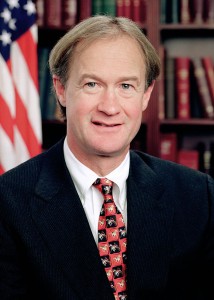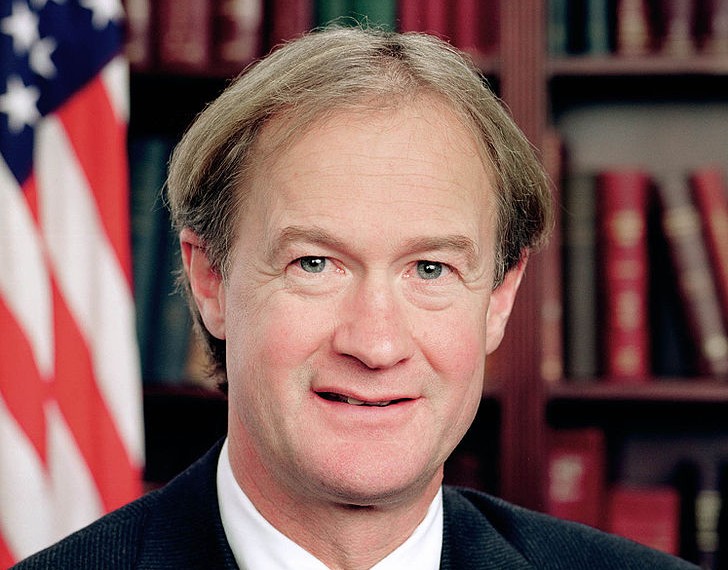Rhode Island governor Lincoln Chafee, currently an independent, announced this week that he will become a Democrat. This move culminates his political metamorphosis from a liberal Republican who served as mayor of Warwick and senator, to an independent who narrowly won a three-way race for governor, to an unpopular governor who will soon face off in a Democratic primary.

(from Wikipedia; public domain)
Chafee has always been an unusual politician. A classics concentrator at Brown, Chafee shoed horses for seven years in the US and Canada before returning to RI to enter politics. Chafee has never been a natural politician, and seems like he would be more at home in a college classroom than the campaign trail. His father, John Chafee, served in the Senate for 23 years, and Lincoln Chafee’s desire for public service apparently derives from his father.
If you were to argue that Chafee’s shifting party affiliations is a sign of political polarization, you’d be partially right. Chafee and his father were two of the last moderate (some would say liberal) Republicans in Congress. Many of his policy positions, including his opposition to the war in Iraq, put him at odds with a party that increasingly demanded purity.
But there is undoubtedly a great deal of political calculation in Chafee’s switch. A poll from Brown University’s Taubman Center put Chafee’s approval rating at 25%. If he runs as either an independent or a Democrat, Chafee will be counting on eking out another win in a three-way race. As an independent, Chafee would face the Republican candidate and a Democrat, either General Treasurer Gina Raimondo or Providence mayor Angel Taveras. Both are more popular than Chafee and stronger candidates than Frank Caprio, who Chafee beat in 2010. Raimondo has already raised $1.7 million (compared to $358,000 for Chafee and $561,000 for Taveras). Running as an independent, Brown professor Wendy Schiller notes, would allow Chafee to sit back as Taveras and Raimondo beat each other up in the primary.
Winning a Democratic primary will still be an uphill battle, but is the smarter route for Chafee. He’ll rely on his name recognition and state and national experience, and hope for a messy primary in which both Taveras and Raimondo trip up. If he is able to secure the Democratic nomination, he’ll be able to use the Democratic apparatus to campaign and fundraise, which would give him a good chance at another term. A danger for Chafee is that primary voters are often partisans and party loyalists, and these people might be disinclined to support someone who so recently became a Democrat.
Chafee will also be banking on the endorsement of President Obama. Chafee endorsed Obama early in his 2008 presidential bid, and campaigned for him in RI. Out of loyalty, Obama refused to endorse Frank Caprio, Chafee’s 2010 Democratic opponent for governor. Obama’s national approval ratings have been slipping, although he his still fairly popular given recent scandals and continuing gridlock. Still, the party of the president tends not to do very well in midterms, at least nationally, so Chafee might not get the bump from Obama that he expects.
A January 2013 poll by Public Policy Polling noted that Chafee’s support in a hypothetical election was about 22% if he ran as an independent facing a Democrat and a Republican, but around 33% if he was the Democratic nominee. The latter poll had Chafee losing to his Republican challenger, which is actually not that surprising given Chafee’s unpopularity and RI’s history of electing Republican governors (the last Democrat was elected in 1995).
The most important number for Chafee is probably RI’s unemployment rate, which currently sits at a four-year low of 8.8%. This is worse than the 7.5% national rate, and the highest in New England. Chafee should still take hope: some political scientists argue that the actual rate matters less than the rate of the decline. If people feel that the economy is improving, they will vote for incumbents. Brown’s poll found that in January that 63% of Rhode Islanders thought the state was heading in the wrong direction. If these numbers don’t change, Chafee is doomed, regardless of his political maneuverings.

Is Switching Parties Enough for Chafee to Avoid Defeat in 2014? | Brown Political Review http://t.co/fzaxZ0xhkw
RT @BrownBPR: Is Switching Parties Enough for Chafee to Avoid Defeat in 2014? The governor’s political gambit. http://t.co/udcGkt6juL